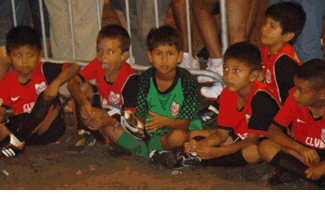
Soccer: a means for social delevelopment in Latin America
Right to Play and CAF's SOMOS Sports Network host workshop for Latin American soccer coaches and trainers in other sports across the region.
Lima, (Jan. 28, 2014)-Right To Play and CAF-development bank of Latin America-hosted an international training workshop from Jan. 28-31 for soccer coaches from various countries belonging to SOMOS Sports Network, a CAF initiative that employs sports as a social inclusion tool in Latin America.
The international event, which took place at the majestic Puericultorio Perez Aranibar grounds in Lima, aimed to train SOMOS coaches so they may go out and spread the benefits of soccer and sports in general, turning them into useful tools that promote social inclusion while building more united communities across the region.
Workshop participants consisted of national sports coordinators and others from professional soccer academies from Cantolao (Peru) and Tahuichi Aguilera (Bolivia), as well as organizations belonging to the New Generation Movement (Panama) and the Colombianitos Foundation (Colombia).
The workshop, run by Right to Play specialists alongside coach Thomas Breistein of Norway, served as an opportunity to deepen theoretical and practical knowledge of the 'Soccer for Development' program implemented across the region. The program also relied on technical assistance provided by the Regional Office for Latin America based in Lima Peru.
The event also served as an opportunity for coaches from different countries to exchange experiences on teaching soccer skills and other sports in different Latin American settings. The event also taught coaches to build skills and techniques in methods that make the sport a tool for social inclusion beyond its competitive nature.
Right to Play methodology, validated worldwide in more than 20 countries, uses sports as a powerful tool to instill values and social skills in children and adolescents, by promoting healthy lifestyles to prevent risky behavior.
Likewise, SOMOS and its partner institutions offer solid alternatives to promote social inclusion activities and development programs that unite communities through sports across Latin America. The network consists of more than 200 trainers skilled in Right to Play methodology and who have made life better for more than 15,000 children and adolescents across the region.
CAF's more recent content

CAF, ECLAC, IDB and PAHO Promote Sustainable Development in the G20
The Regional Organizations of the Americas congratulate Brazil on its successful G20 Presidency, highlighting its leadership on key issues such as poverty, governance, and climate change. They also reaffirm their commitment to actions that promote equity and development in the region.
Urgent Call for Action to Safeguard Caribbean SIDS at CAF Symposium
As the global community grapples with the escalating climate crisis, Caribbean Small Island Developing States (SIDS) are running out of time to secure critical investments and support needed to strengthen their economies and protect vulnerable communities from the intensifying impacts of climate change. With the window to take decisive action rapidly shrinking, CAF - Development Bank of Latin America and the Caribbean, in partnership with the Commonwealth Secretariat and the Antigua and Barbuda High Commission, brought together key stakeholders for a symposium in London to address the critical vulnerabilities Caribbean SIDS face.